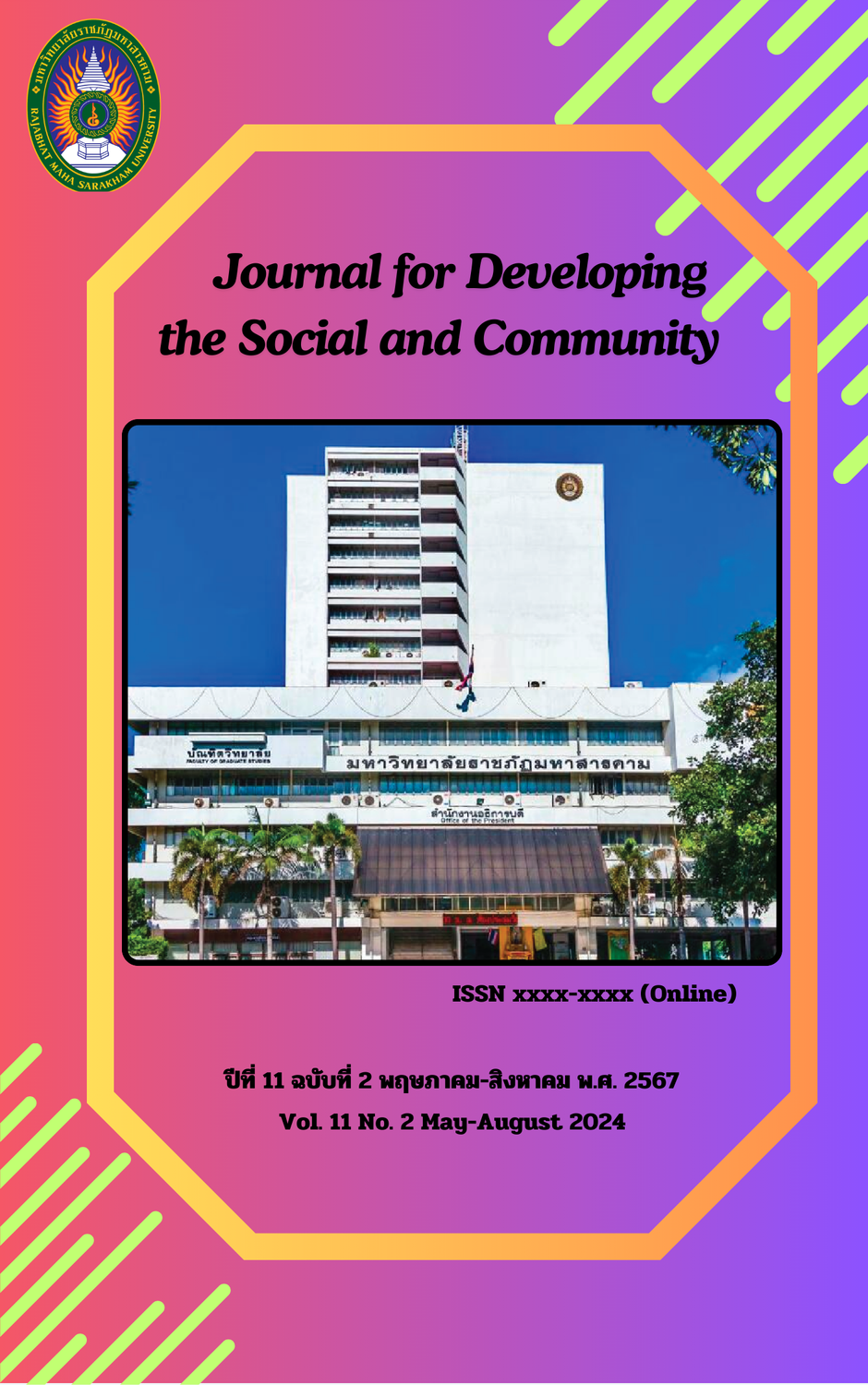A Study of Algebraic Thinking and Mathematical Reasoning for grade seven students
Abstract
This research article aims to 1) study the level of algebraic thinking of the seven grade students, 2) study the level mathematical reasoning of the seven grade students, and 3) study the relation between the algebraic thinking and mathematical reasoning of the seven grade students. The target group used in this research was a grade seven students at Tha Khon Yang Pittayakhom School. Kantharawichai District, Maha Sarakham Province, In the second semester of the academic year 2022, 83 people. Research tools were a level of algebraic thinking quiz, a mathematical reasoning quiz, and and semi-structure interviews about algebraic thinking and mathematical reasoning. Statistics for research were percentage, average, standard deviation and pearson correlation coefficient. Data were presented through descriptive analysis.
The results of the study revealed that: 1) The algebraic thinking of the seven grade students mostly at level 3 Multi-Structural, representing 28.92 percent, 2) mathematical reasoning of the seven grade students mostly at level 3 Informal Quantitative Reasoning, representing 53.01 percent, and 3) the relation between the algebraic thinking and mathematical reasoning is very related. With the coefficient of relations equal to .797. And from the interviews, it was found that students with level 5 Extended Abstract algebraic thinking were able to find answers and be able to explain concepts and solve problems. and can check the correctness of the answers they give themselves. Students with Level 4 Relational Algebraic Thinking can find the correct answer. and can check the correctness of some answers. Students with level 3 Multi-Structural Algebraic Thinking are able to explain concepts and solve problems. Can use thinking skills and calculations correctly in some items. Students with level 2 Unistructural Algebra Thinking know how to solve problems. but cannot use their thinking and numeracy skills to find the answer. And students with Level 1 Prestructural Algebraic Thinking were able to tell variables. but unable to calculate the answer.
References
Boonplod, N. (2019). A study of the use of Algebraic Thinking Skills by 12th Grade High School Studens Enrolled at Srikranuanwittayakom School. Master of Education (Mathematic Education). Maha Sarakham: Rajabhat Maha Sarakham University.
Boonprajak, S. (1997). Development of Mathematical Power of Mathayom Suksa 1 Students Through Cooperative Learning. Doctor of Education degree in Mathemetics Education: Srinakharinwirot University.
Department of Curriculum and Instruction Development. (2002). Mathematics learning management manual. Bangkok: Kurusapa Printing Ladphrao.
National Council of Teachers of Mathematics. (1989). Curriculum and Evaluation Standards for School Mathematics. Reston, VA: The National Council of Teachers of Mathematics.
National Council of Teachers of Mathematics. (2000). Principles and standards for school mathematics. Reston, VA: Author.
Rakes, Chris & Valentine, Jeffrey & Mcgatha, Maggie & Ronau, Robert. (2010). Methods of Instructional Improvement in Algebra A Systematic Review and Meta- Analysis. Review of Educational Research, 80,72-400.
Stacey, Ralph. (2000). The Emergence of Knowledge in Organization. Emergence. A Journal of Complexity Issues in Organizations and Management. 2(2), 23-39. 10.1207/ S15327000EM0204_05.
Sukhoyachai, P. (2019). A Study of The Relationship between Algebraic Thinking and Mathematical Problem Solving of Eighth Grade Students. Master of Education (Mathematic Education). Maha Sarakham: Rajabhat Maha Sarakham University.
Tetsrimueang, W. (2021). The study of approaches to enhancement the level of mathematical reasoning; Linear Equation of One Variable Mattayomsuksa 1. Master of Education (Mathematic Education). Maha Sarakham: Rajabhat Maha Sarakham University.
Thipkong, S. et al. (2010). Agricultural Demonstration Mathematics Teacher Experience Book. Bangkok: Education Research and Development Center Demonstration School of Kasetsart University.
Usiskin, Z. (1999). Algebra and Calculus for All?. Journal of Mathematics and Science: Collaborative Explorations, 2(1), 73-88.
Worakham, P. (2021). Education Research (12thed). Maha Sarakham: Taksila Printing
Downloads
Published
How to Cite
Issue
Section
License
Copyright (c) 2024 Journal of Research and Development Institute Rajabhat Maha Sarakham University

This work is licensed under a Creative Commons Attribution-NonCommercial-NoDerivatives 4.0 International License.
Articles that are published are copyrighted by the authors of the articles







